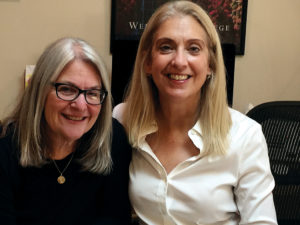By Peggy Stacy and Gail E. Meyer
In March, The Atlantic published a thought-provoking article detailing the complex and competitive state of college admissions.
Of the process, Rod Skinner, director of college counseling at Milton Academy, an elite New England prep school, is quoted as saying, “Instead of being a wonderful exploration of the future and something that’s exciting and dynamic and happy, it’s a burden, a thing to be feared, a thing to be endured.”
Applying to college in 2016 is generating anxiety and soul searching from a personal, institutional and even a societal level. Yet out of this frenetic quagmire of test scores, grades, and strategic extracurricular activities, the personal statement and supplemental essays emerge as unique opportunities for self-reflection and authenticity.
That girl with a passion for dance, whose first ragged toe shoes still hang from a brass hook on her closet door, might recount the discipline gleaned from hours at the barre, helping her to solve tricky physics problems or ponder the historical significance of the Emancipation Proclamation.

Perhaps the boy who struggled through his parents’ divorce can connect his own painful experience to the satisfaction of serving as a peer counselor and his interest in studying psychology.
And when a hilarious family fishing trip goes awry, what are the enduring lessons learned?
We have read wonderful essays on all kinds of subjects—from teaching oneself to play the banjo while recovering from a broken foot to creating gluten-free recipes for a friend—from taking the wrong bus and getting lost at dusk to a shattering brush with racism.
There are currently four different college application platforms and each has its own essay requirements; students must check each school on their list to find out how to apply. Some schools, like Georgetown University, have their own application.
Over 500 colleges accept The Common Application. The University of Wisconsin and Indiana University joined the Common Application this year.
The Universal Application has 44 member colleges. Rice University, for example, accepts either the Common App or the Universal App.
The Coalition for College Access is a newly formed group of 90 colleges and universities that hopes to improve access for underserved college applicants. The University of Washington will only accept the Coalition application.
Many, if not most local students will apply to the University of California. For the first time in nearly a decade, the UC application has changed. Essay prompts have become personal insight questions. Students can choose to write about their favorite subject at school, about creativity or leadership, about challenges faced or the importance of community. Each of four questions (out of a total of eight) is answered in 350 words or less, encouraging a thoughtful, multidimensional response.
It is not uncommon for students to dread writing application essays. We have seen perfectly sane, energetic and accomplished kids lay their weary heads on the desk at the mere thought of them. But when the mystery is removed and our students realize that they can be themselves, most heave a sigh of relief.
Learning to write clear and descriptive narrative essays yields benefits beyond self discovery and a winning college application. The ability to combine critical thinking skills with active verbs, colorful detail and self
editing translates handily to academic writing assignments—an unexpected bonus.
We like to remind our high school seniors to brainstorm and dream a little, temporarily shutting out the noisy sounds of pressure and expectation.
Think about the things you enjoy, we tell them. What inspires or intrigues you? What concerns you or makes you laugh?
After that, just start writing.
(Peggy Stacy served as the College Center Writing Coach at Palisades Charter High School for nine years. She has a BA in English Literature from UCLA and works as a writing tutor in Pacific Palisades. Gail Meyer, MSW, is a Certified Educational Planner (CEP), the highest level of professional certification for educational consultants. She is on the Board of Directors for the Independent Educational Consultants Association, where for the past two years she served as board president.)












You must be logged in to post a comment.